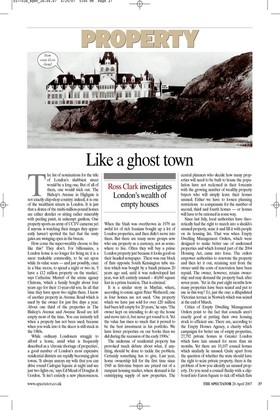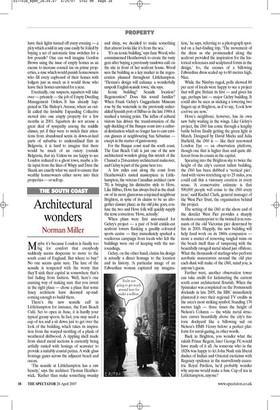Like a ghost town
Ross Clark investigates London’s wealth of empty houses
The list of nominations for the title of London’s shabbiest street would be a long one. But of all of them, one would stick out. The Bishop’s Avenue in Highgate is not exactly chip-shop country; indeed, it is one of the wealthiest streets in London. It is just that a dozen of the multi-million-pound homes are either derelict or sitting rather miserably with peeling paint, in unkempt gardens. One property sports an array of CCTV cameras; yet if anyone is watching their images they apparently haven’t spotted the fact that the rusty gates are swinging open in the breeze.
How come the super-wealthy choose to live like this? They don’t. For billionaires, a London home is no longer for living in; it is a mere tradeable commodity, to be sat upon while its value soars — and just possibly, once in a blue moon, to spend a night or two in. ‘I have a £12 million property on the market,’ says Catherine Merrett of the estate agency Cluttons, ‘which a family bought about four years ago for their 11-year-old son. In all that time they have spent two nights there. I know of another property in Avenue Road which is used by the owner for just five days a year. About one third of the properties in The Bishop’s Avenue and Avenue Road are left empty most of the time. You can instantly tell when a property has not been used, because when you walk into it the decor is still stuck in the 1980s.
While ordinary Londoners struggle to afford a home, amid what is frequently described as a ‘chronic shortage of properties’, a good number of London’s most expensive residential districts are rapidly becoming ghost towns. ‘It always annoys my wife that you can drive round Cadogan Square at night and see just two lights on,’ says Ed Mead of Douglas & Gordon. ‘It isn’t entirely a new phenomenon. When the Shah was overthrown in 1979 an awful lot of rich Iranians bought up a lot of London properties, and then didn’t move into them. But there are many more groups now who use property as a currency, not as somewhere to live. Often they will buy a prime London property just because it looks good on their headed notepaper. There was one block of flats opposite South Kensington tube station which was bought by a Saudi princess 20 years ago and, until it was redeveloped last year, was left entirely unused – 40,000 square feet in a prime location. That is criminal.’ It is a similar story in Mayfair, where, according to estate agent Peter Wetherell, one in four homes are not used. ‘One property which we have just sold for over £20 million had been left empty for 20 years,’ he says. ‘The owner kept on intending to do up the house and move into it, but never got round to it. Yet the value has risen so much that it proved to be the best investment in his portfolio. We have fewer properties on our books than we did during the recession of the early 1990s.’ The underuse of residential property has provoked much debate about what, if anything, should be done to tackle the problem. Certainly something has to give. Last year, home ownership fell for the first time since 1945 as first-time buyers are priced out of a rampant housing market, where demand is far outstripping supply of new properties. The central planners who decide how many properties will need to be built to house the population have not reckoned in their forecasts with the growing number of wealthy property buyers who will simply leave their homes unused. Either we have to loosen planning restrictions to compensate for the number of second, third and fourth homes — or homes will have to be rationed in some way.
Since last July, local authorities have theoretically had the right to march into a sheikh’s unused property, seize it and fill it with people on its housing list. That was when Empty Dwelling Management Orders, which were designed to make better use of underused properties and which formed part of the 2004 Housing Act, came into force. The orders empower authorities to renovate the property and then let it out, retaining rent from the owner until the costs of renovation have been repaid. The owner, however, retains ownership and may demand the property back after seven years. Yet in the past eight months how many properties have been seized and put to use in this way? Er, just the one: a dilapidated Victorian terrace in Norwich which was seized at the end of March.
Critics of Empty Dwelling Management Orders point to the fact that councils aren’t exactly good at putting their own housing stock to efficient use. There are, according to the Empty Homes Agency, a charity which campaigns for better use of empty properties, 27,792 private homes in Greater London which have lain unused for more than six months. Yet there are 10,107 council homes which similarly lie unused. Quite apart from the question of whether the state should have the right to seize private property, there is the problem of how you identify an unused property. Do you send a council flunky with a clipboard into Eaton Square to tick off which flats have their lights turned off every evening — a ploy which could in any case easily be foiled by buying a set of automatic time switches for a few pounds? One can well imagine Gordon Brown using the issue of empty homes as an excuse to increase council tax on prime properties, a ruse which would punish homeowners who fill every cupboard of their homes with lodgers just as much as it would those who leave their homes unvisited for a year.
Eventually, one suspects, squatters will take over — privately — the job of Empty Dwelling Management Orders. It has already happened in The Bishop’s Avenue, where an outfit called the Invisible Expanding Collective moved into one empty property for a few months in 2001. Squatters do not arouse a great deal of sympathy among the middle classes, yet if they were to switch their attentions from abandoned semis in down-at-heel parts of suburbia to underutilised flats in Belgravia, it is hard to imagine that there would be much of an outcry (outside Belgravia, that is). Unless we are happy to see London reduced to a ghost town, maybe a little input from the likes of Wispy and Dave the Skunk are exactly what we need to ensure that wealthy homeowners either move into their properties — or sell up.

























































 Previous page
Previous page